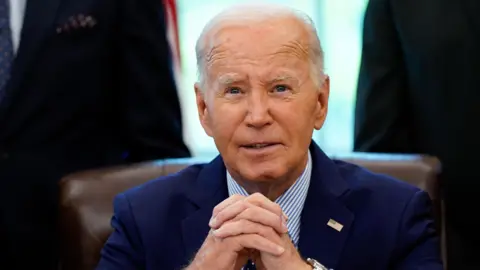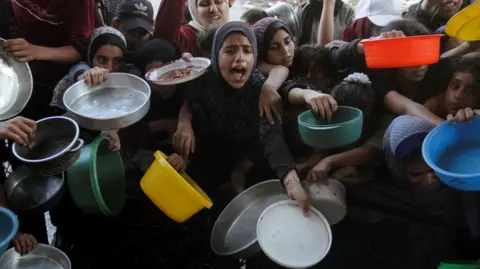 Reuters
ReutersJoe Biden says he’s “optimistic” a ceasefire deal can be reached.
“We are closer than we have ever been,” the US president said after the recent meeting, adding that he would send the secretary of state to Israel to continue “intensive efforts to finalize this agreement.”
Amid concerns that Iran could launch attacks against Israel over the assassination of Hamas leader Ismail Haniyeh in Tehran, President Biden said “no one in the region should take steps to undermine this process.”
Hamas has expressed skepticism about the possibility of negotiations, and Israel said it was “appreciative of the efforts of the United States and mediators to persuade Hamas to reject the hostage release negotiations,” without mentioning the possibility of a ceasefire.
In a recent joint statement, the United States, Qatar and Egypt said they had put forward a proposal for a ceasefire and hostage release talks that would “bridge the gap” between Israel and Hamas.
Israel says the ceasefire agreement requires the release of the remaining hostages taken by militants to Gaza during the October 7 offensive against Israel. Some of the 251 hostages have already been released, while others are believed to have died in Gaza.
Relatives of the hostages remaining in Gaza say the current negotiations represent the “last chance” to get some of them out alive.
After ten months of war and thousands of casualties, there is enormous pressure to find a breakthrough.
If talks between Israel and Hamas completely collapse, there is a strong possibility that the regional conflict will escalate further, and everyone involved is afraid.
The mediators said the two-day ceasefire The discussion was “conducted in a serious, constructive and positive atmosphere”.
The technical team is expected to continue working on details of how to implement the proposed terms in the coming days, with senior government officials hoping to meet again in Cairo to reach an agreement on the terms laid out in Doha.
The mediators’ statement is certainly a positive development, but there is still a long way to go before a ceasefire can be agreed.
This isn’t the first time Mr Biden has said he thinks a deal is close, and not everyone shares his cautious optimism.
Neither Hamas nor the Israeli government responded particularly optimistically.
A senior Hamas official told the BBC that Israel had actually changed some of its demands for free movement of people within Gaza if a ceasefire was agreed and Israeli military control of key areas of the Strip was maintained.
Israel said its position and core principles remained unchanged and were “well known”, and accused Hamas of not agreeing to negotiations for the release of the hostages.
Above all, Israelis want the remaining hostages to be released, but many are skeptical that is the primary goal of Israeli Prime Minister Benjamin Netanyahu, who has insisted that “complete victory” over Hamas is his government’s priority.
The Israeli military launched an operation to destroy Hamas in the Gaza Strip in response to an unprecedented attack in southern Israel on October 7, which killed about 1,200 people.
More than 40,000 people have died in Gaza since then, according to the Hamas-run Gaza Strip Health Ministry.
In a deal reached in November, Hamas released 105 hostages in exchange for a week-long ceasefire and the release of about 240 Palestinian prisoners held in Israeli jails. Israel says 111 hostages are still being held, 39 of whom are believed to be dead.
 Reuters
ReutersA senior Hamas official who was not involved in the talks but is in contact with Qatari and Egyptian officials told the BBC that the Doha talks had not produced “a commitment to implement the agreements made in July”.
During the talks, Hamas reportedly withdrew its demand for a permanent ceasefire and said it would be willing to mediate a six-week ceasefire proposed by President Biden to end the war.
President Biden’s ceasefire proposal also included an Israeli military withdrawal from all hostage areas in Gaza, a gradual release of hostages in exchange for Palestinian prisoners, and the return of the remains of dead hostages.
But Hamas accused Israel of presenting new terms a week later, although it is said it remains open to revisiting the previous version of the agreement.
The “bridging proposal” put forward by U.S., Egyptian and Qatari negotiators will be the subject of U.S. Secretary of State Antony Blinken’s regional talks and will form the basis for the next round of talks in Cairo, where all parties, including Hamas, are expected to attend.
The proposal is said to “bridge the remaining gap” between the two sides’ positions, which could allow for “rapid implementation of the agreement.”
It may seem simple, but there are significant hurdles to overcome, and there is still a complete lack of trust between senior Israeli and Hamas officials.
They are dragged to the negotiating table – perhaps against their own wishes – by others who fear what will happen if they fail.
Meanwhile, Israel’s military operation in Gaza continues, with new evacuation orders issued for several blocks north of Khan Yunis and Deir Balakh, further reducing the humanitarian protection zone.
Israel said the area had become dangerous for civilians due to “serious terrorist attacks” and rocket and mortar fire into Israel.
“Once again, fear spreads as families have nowhere to go. People are trapped in a nightmare of endless death and destruction on a massive scale,” the UN agency for Palestine refugees (UNRWA) said.
Making the need for a ceasefire all the more urgent is the fact that the polio virus, spread through feces, is circulating in the Israeli-designated humanitarian zone in Gaza where hundreds of thousands of Palestinians have sought refuge from the fighting.
“Let me be clear: the ultimate vaccine against polio is peace and an immediate humanitarian ceasefire,” said U.N. Secretary-General António Guterres.

